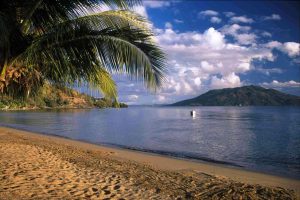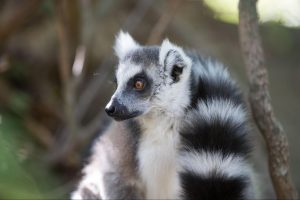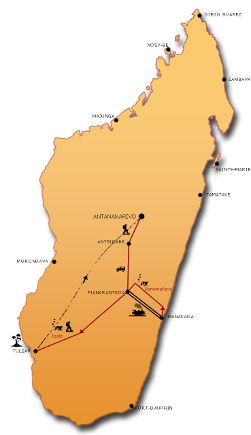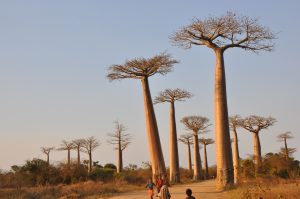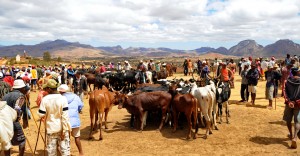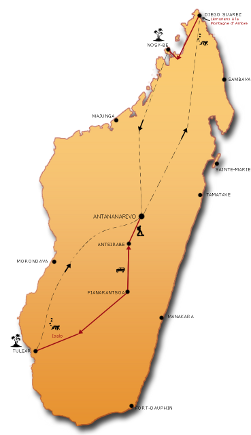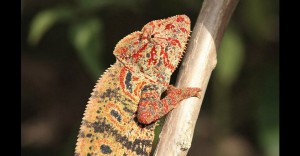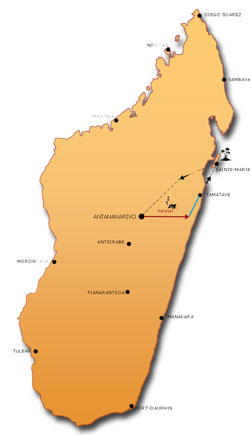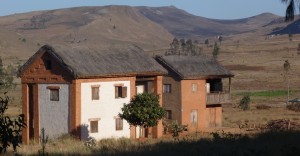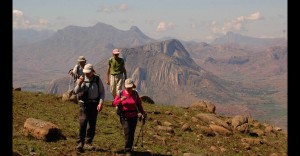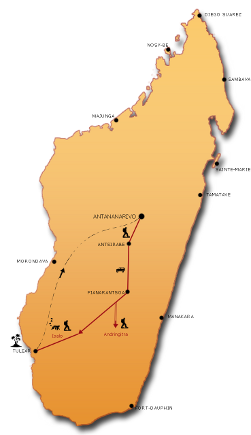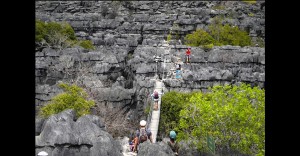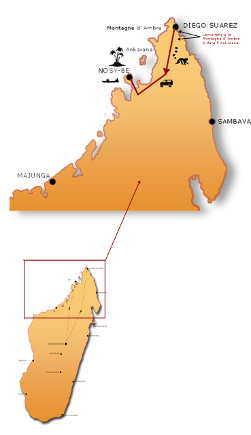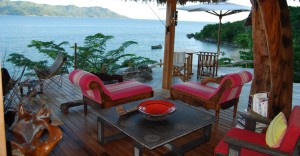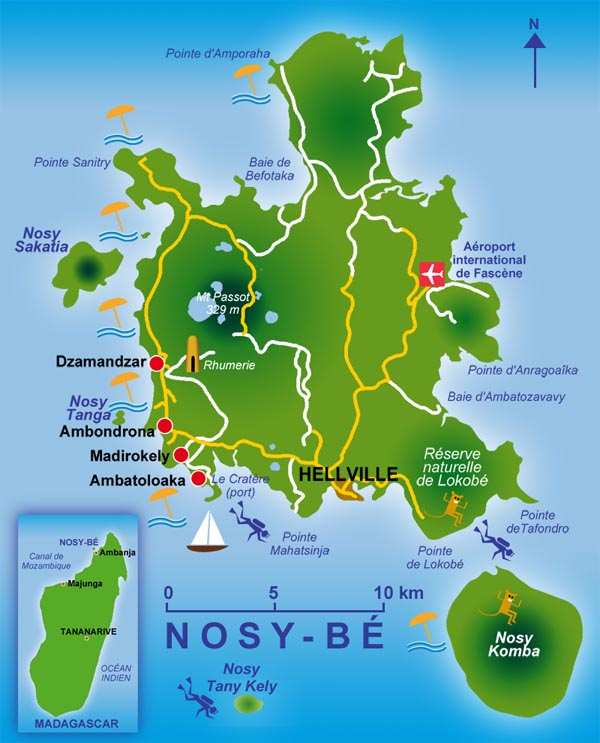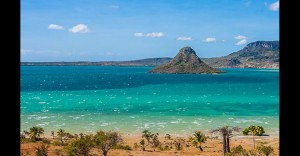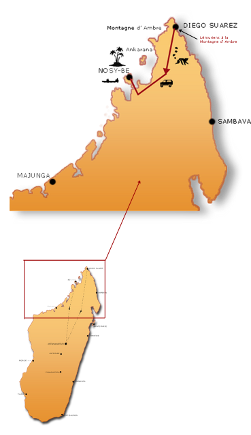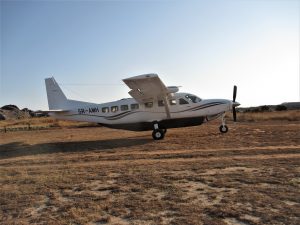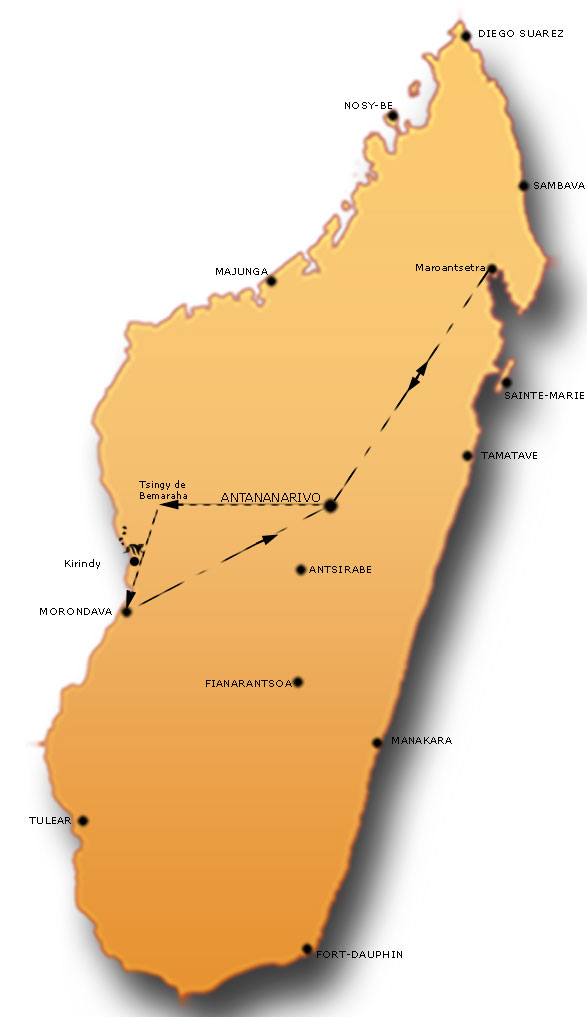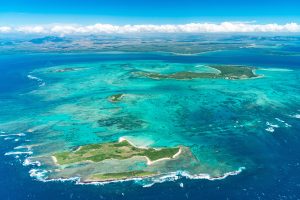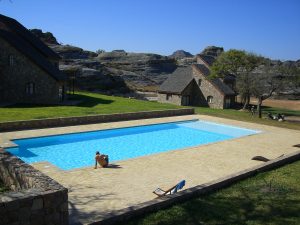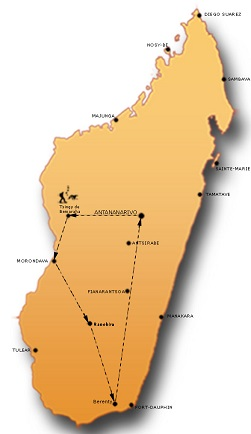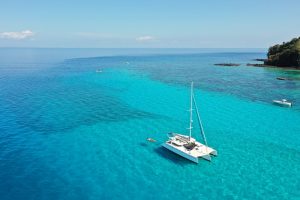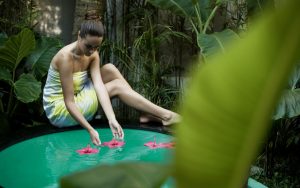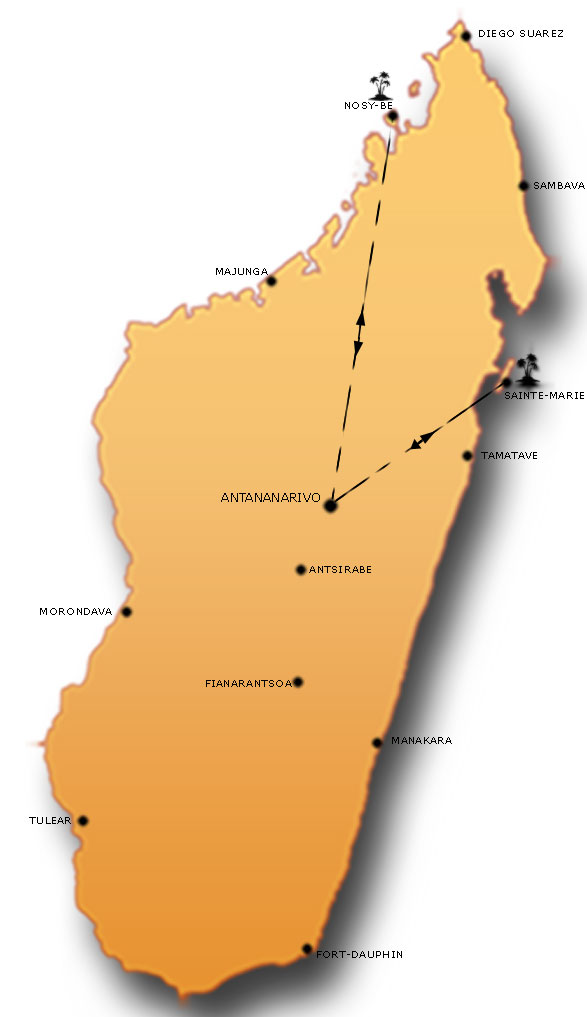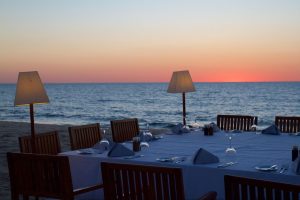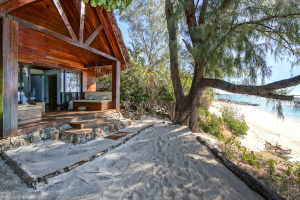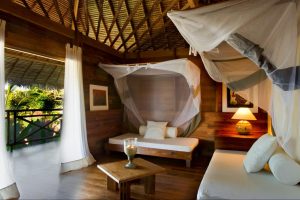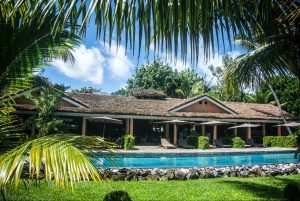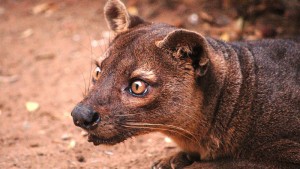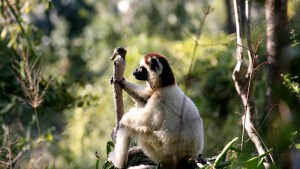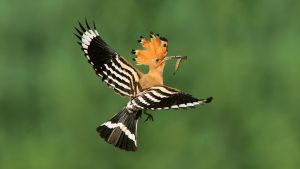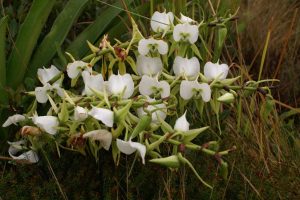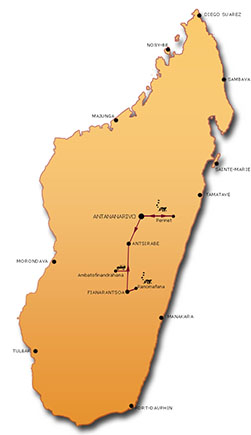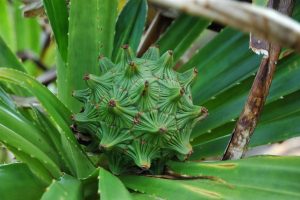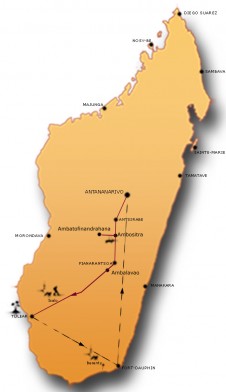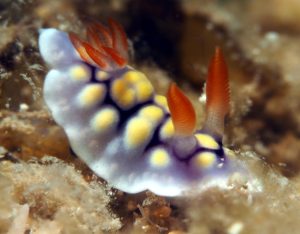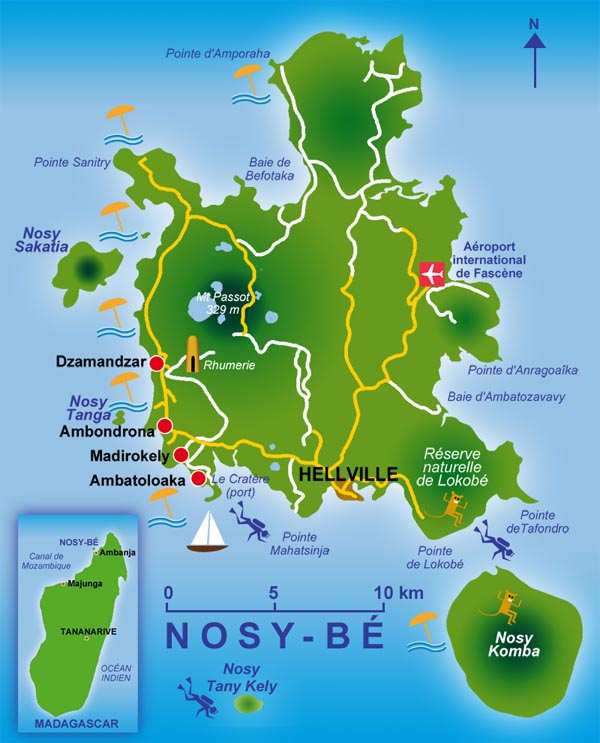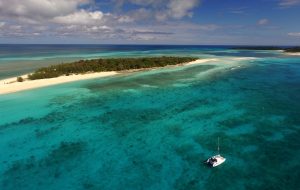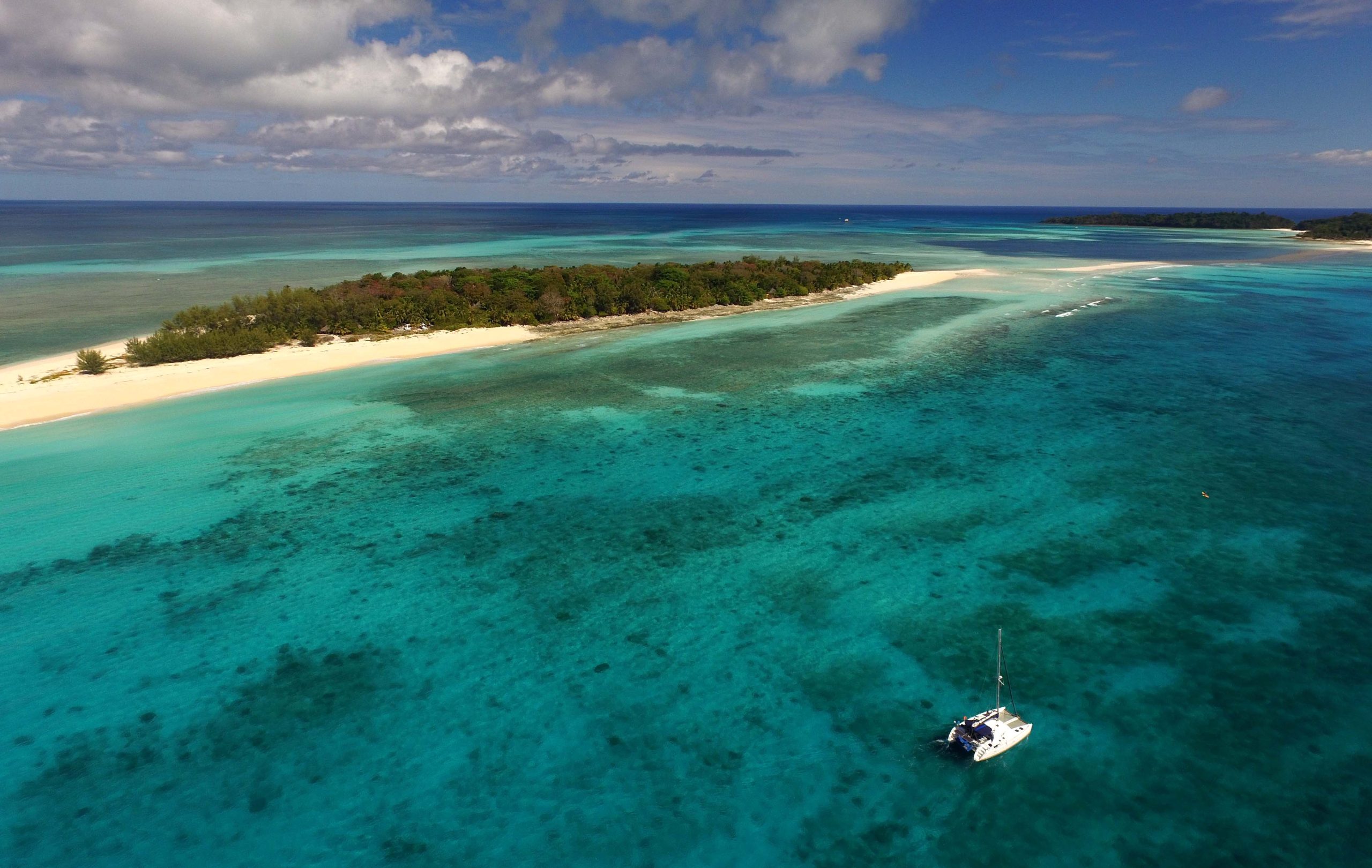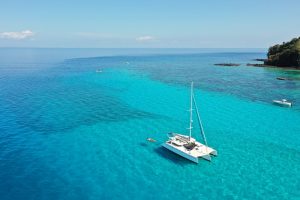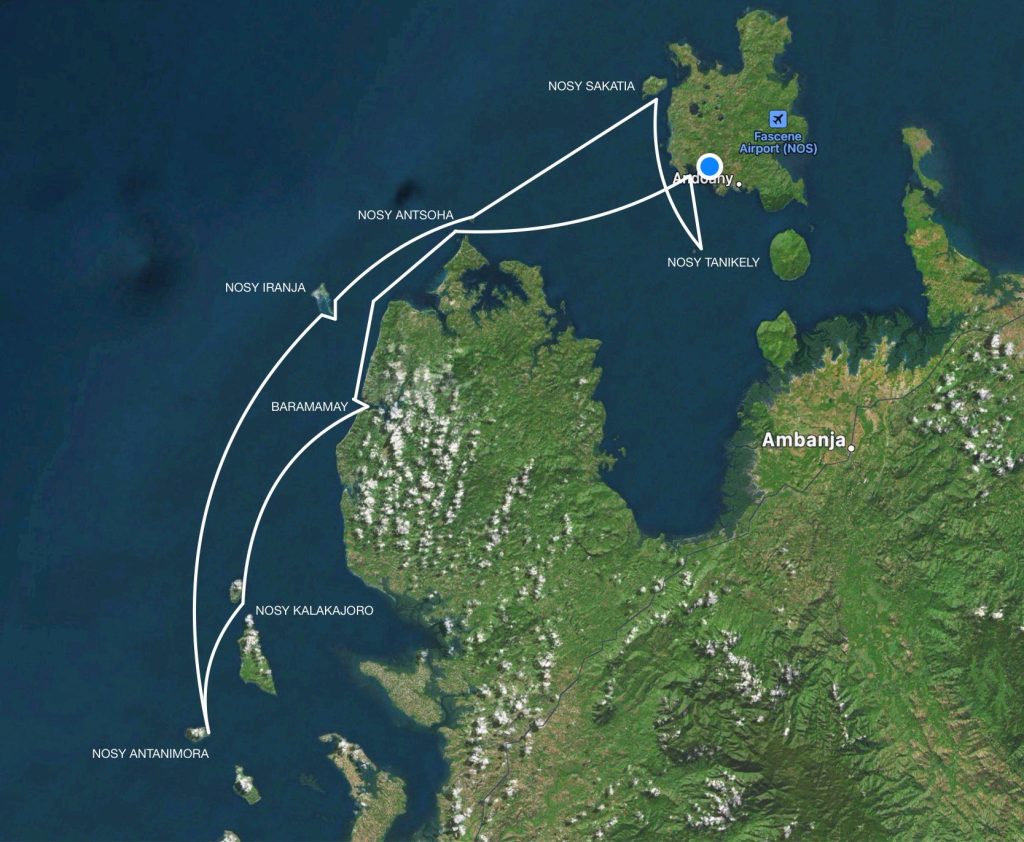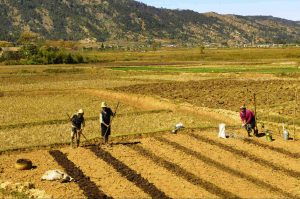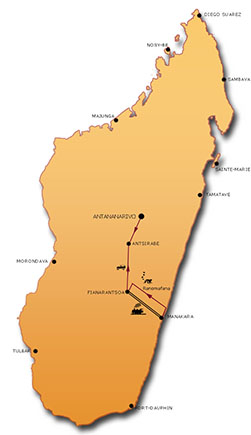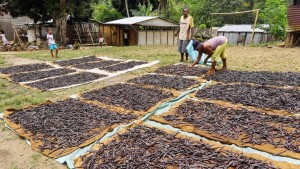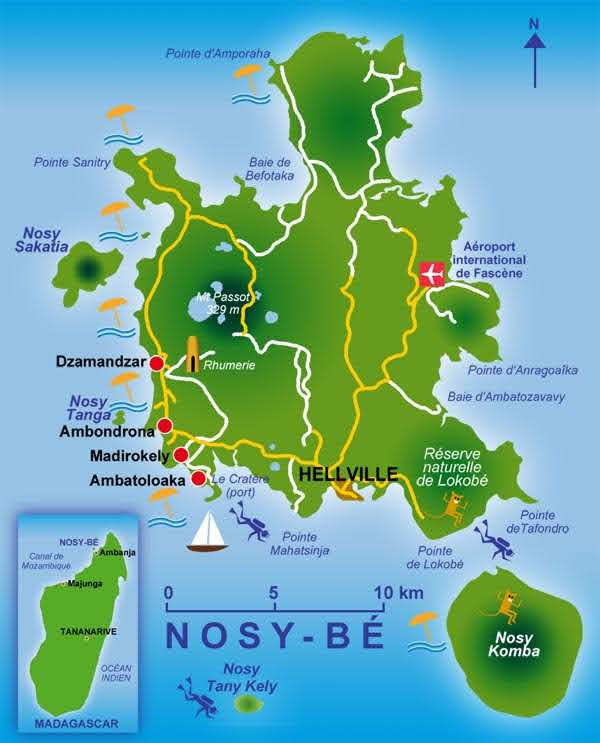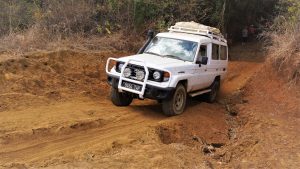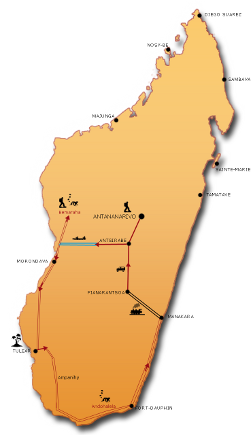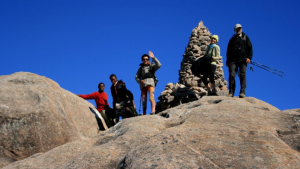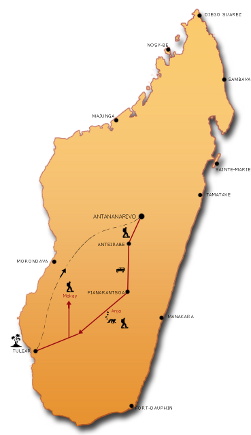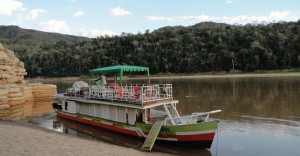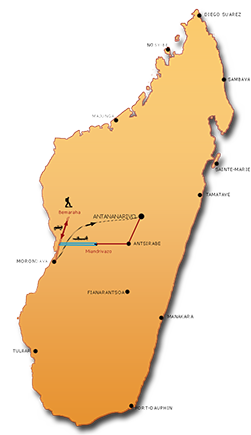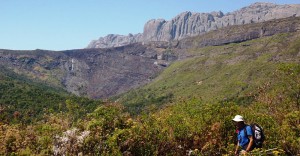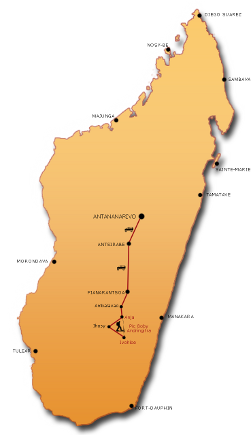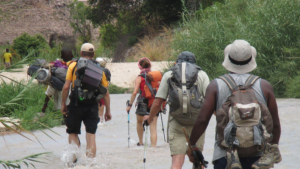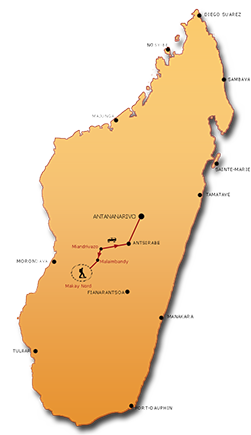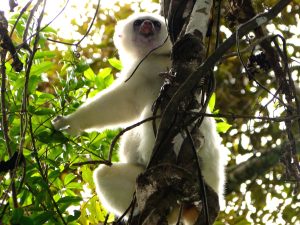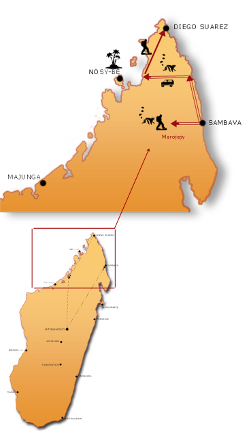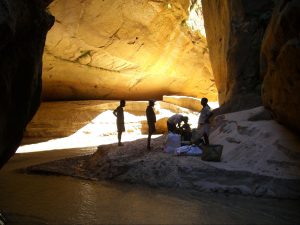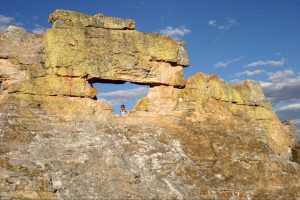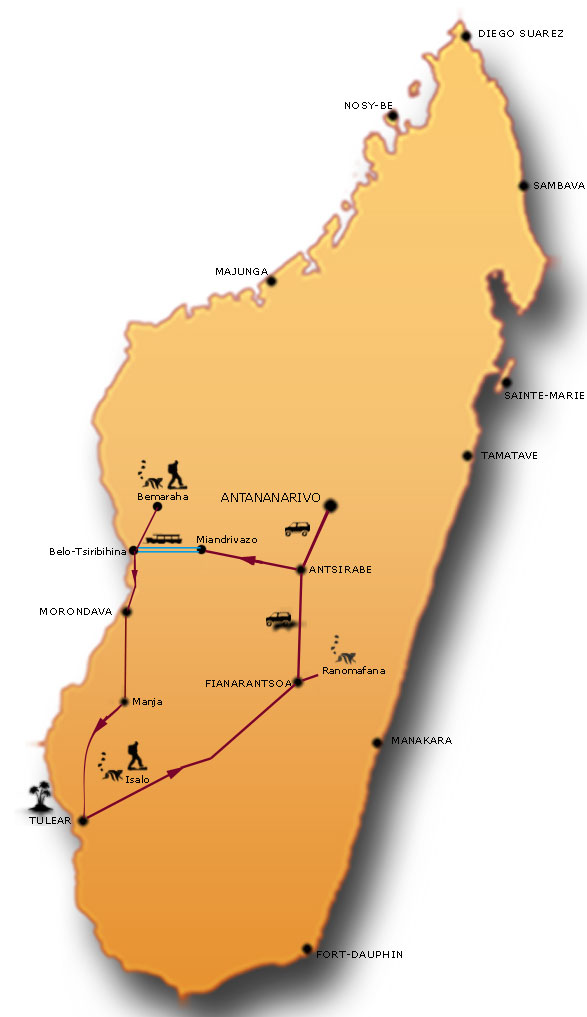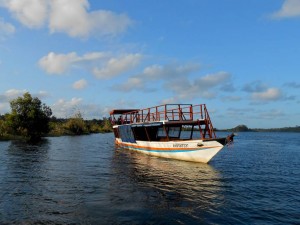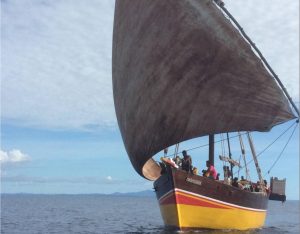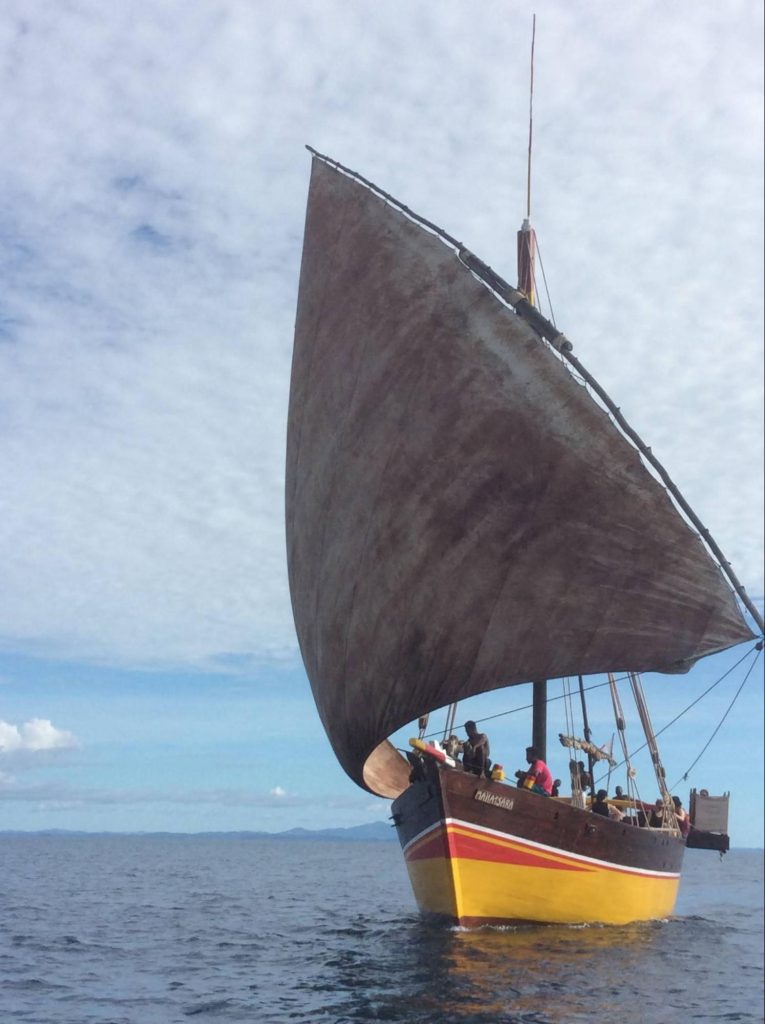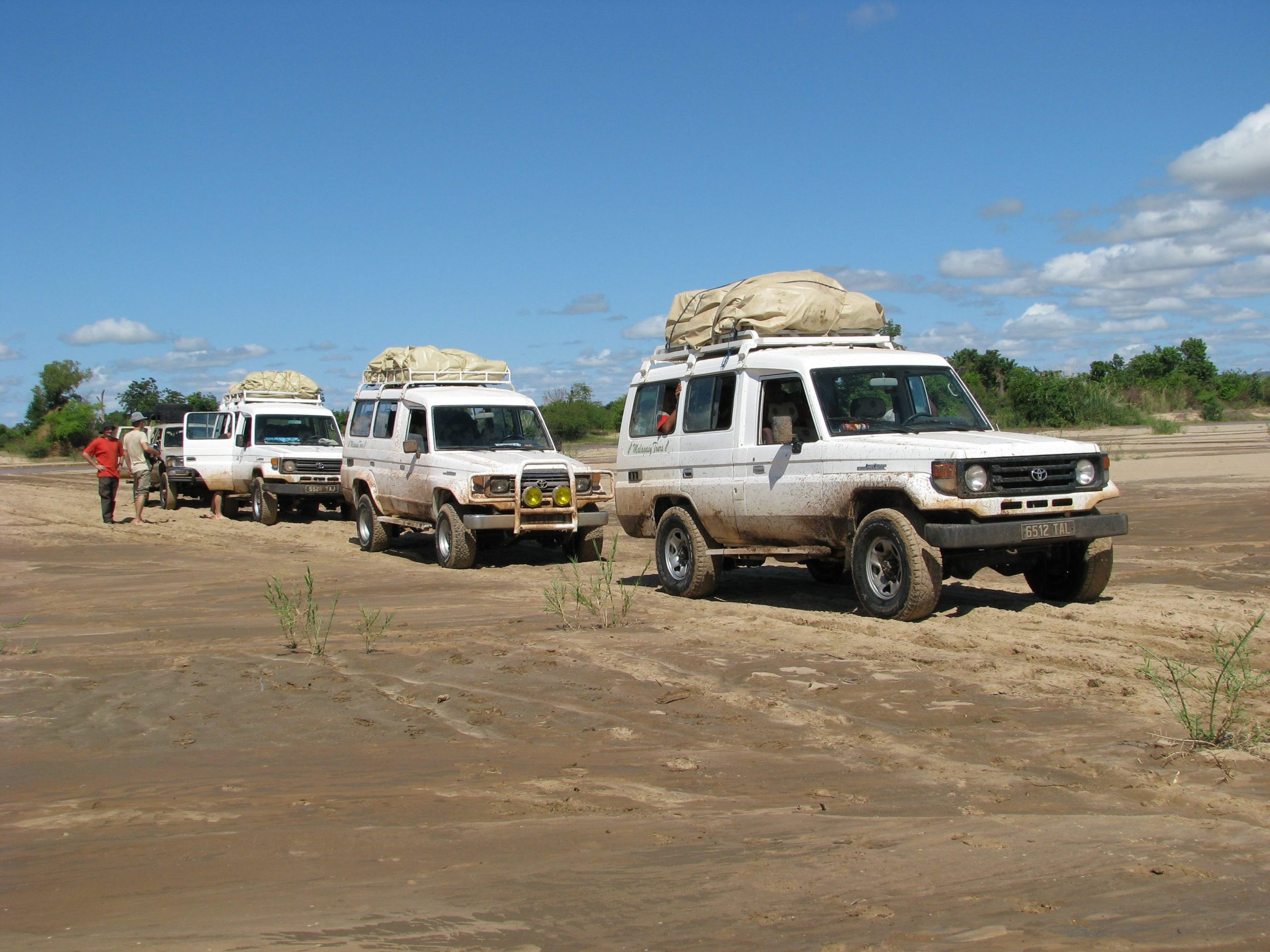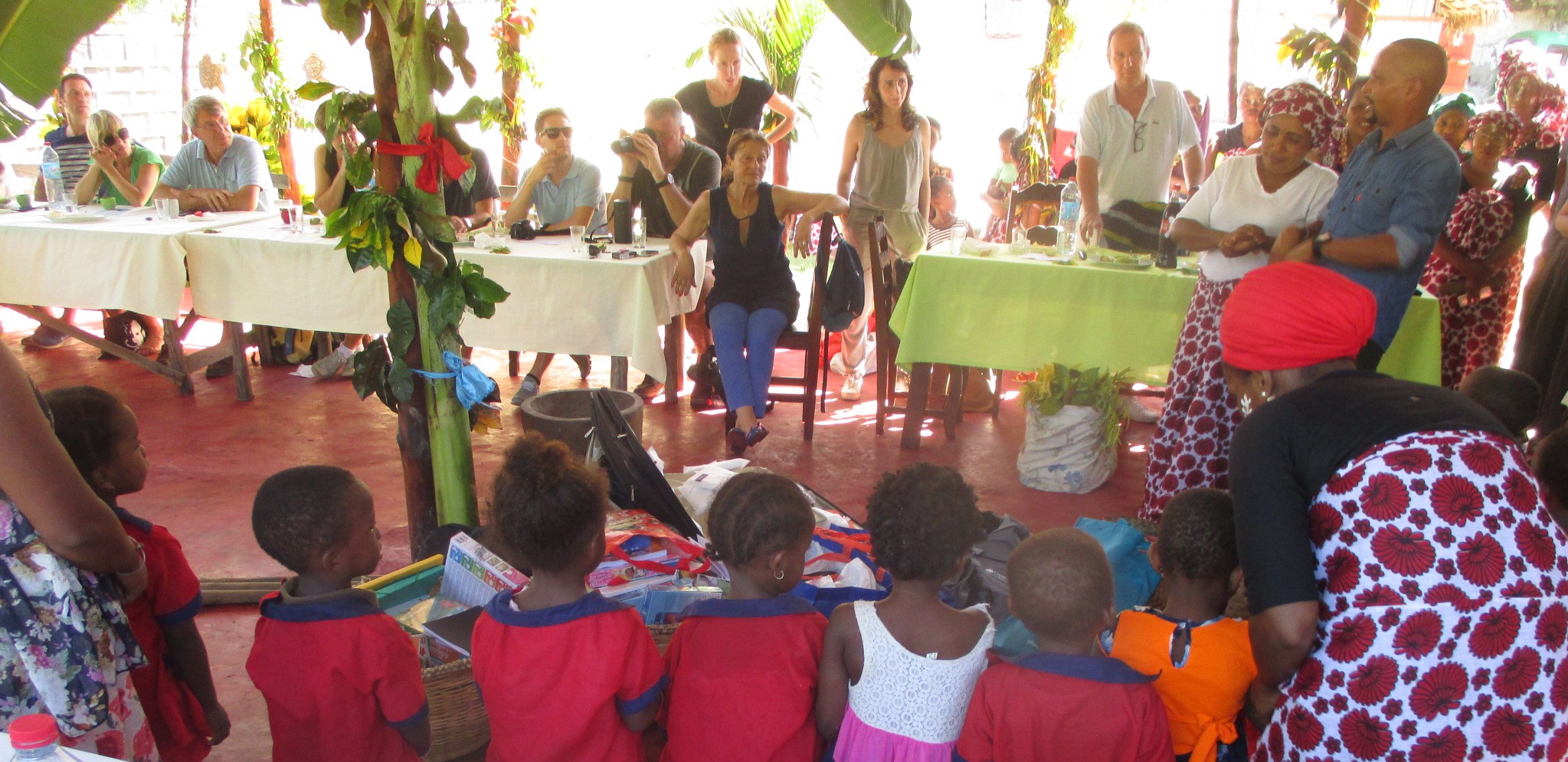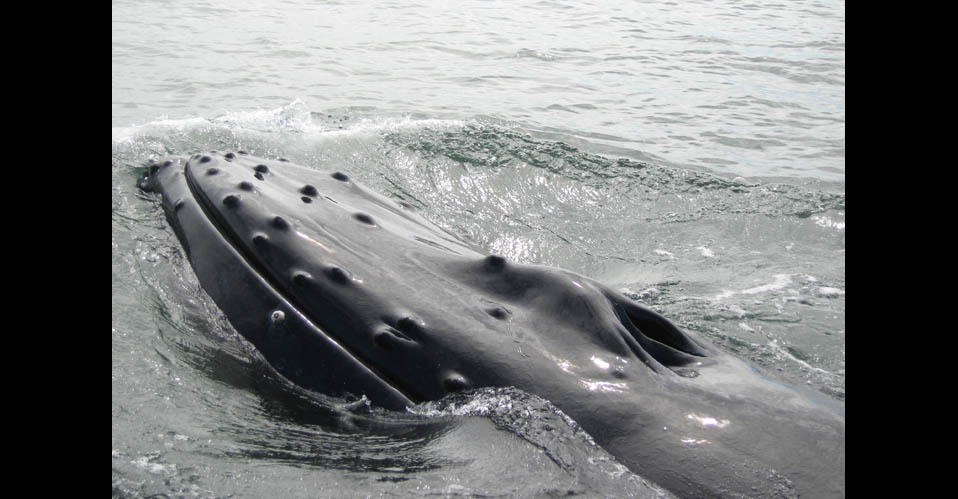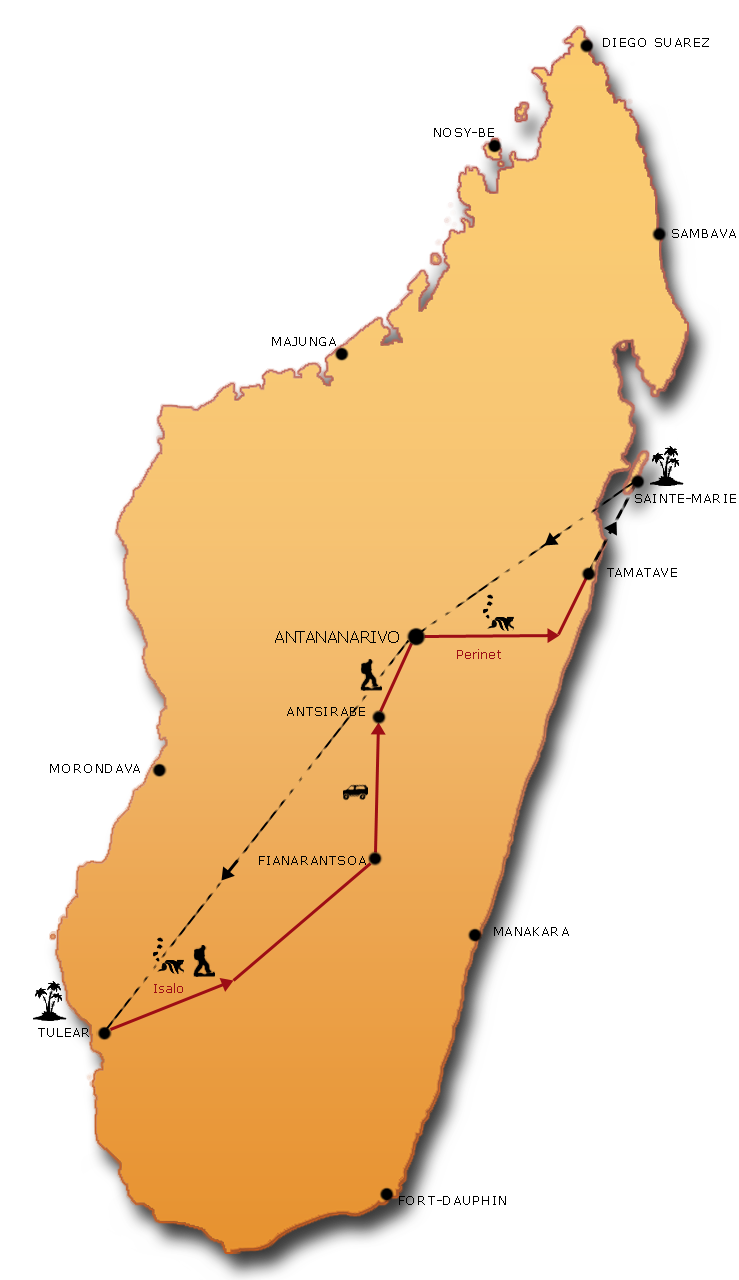 The starting point of Malagasy tours is from the most beautiful lagoons of this Great Island, Ifaty, in the country of Vezo sea nomadic fishermen. We travel across large plains of palm trees and baobabs to join the ruinform massif of Isalo. The highlands crossing offers to travelers another face of Madagascar, marriage of rice and water. A flash passage in Antananarivo to discover this commemorative site of Merina monarchy and Malagasy history. The road to the east opens us its luxuriant reserves, rich in butterflies, chameleons and lemurs. Last stopover in Sainte Marie (Nosy Boraha), peaceful island with paradise flavors . For big cetaceans lovers , plan to travel in July, August and September to observe the ballet of whales!
The starting point of Malagasy tours is from the most beautiful lagoons of this Great Island, Ifaty, in the country of Vezo sea nomadic fishermen. We travel across large plains of palm trees and baobabs to join the ruinform massif of Isalo. The highlands crossing offers to travelers another face of Madagascar, marriage of rice and water. A flash passage in Antananarivo to discover this commemorative site of Merina monarchy and Malagasy history. The road to the east opens us its luxuriant reserves, rich in butterflies, chameleons and lemurs. Last stopover in Sainte Marie (Nosy Boraha), peaceful island with paradise flavors . For big cetaceans lovers , plan to travel in July, August and September to observe the ballet of whales!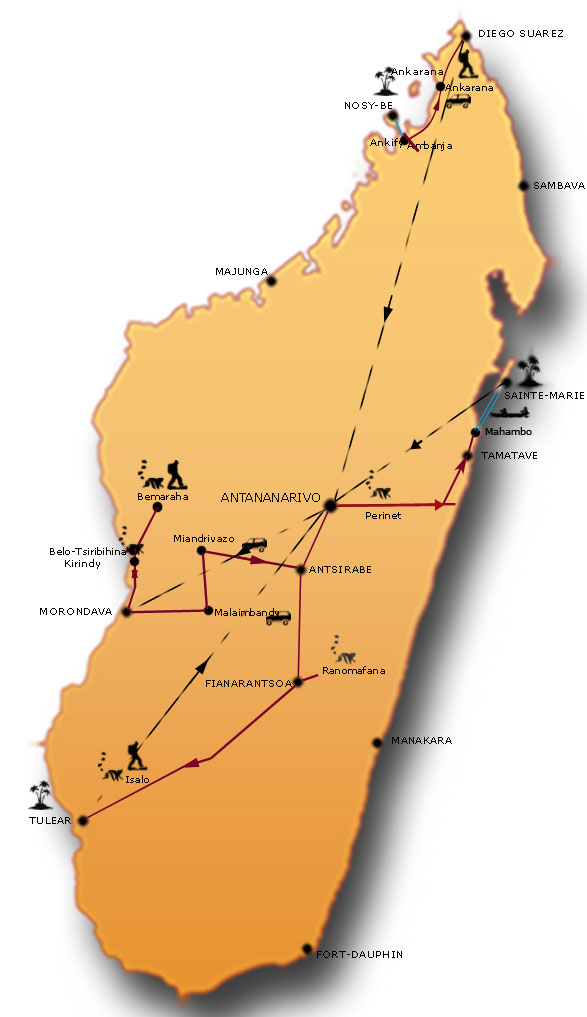 The most complete trip possible to discover the different regions of Madagascar. Each has its population, its ethnic groups, its way of life, its rhythm. The atmospheres are not the same whether you are in Diego or Fianarantsoa, the people are different, their daily life too. From the nonchalant and colorful north in the Nosy Be region to the central Highlands where the rice terraces draw the hills. From the Baobab forests of the West to the white beaches of Ste Marie.
This route allows you to visit several parks and reserves and to understand the many biotopes of the country and to meet many species of animals that inhabit these diverse environments.
Several trips to the same country!
The most complete trip possible to discover the different regions of Madagascar. Each has its population, its ethnic groups, its way of life, its rhythm. The atmospheres are not the same whether you are in Diego or Fianarantsoa, the people are different, their daily life too. From the nonchalant and colorful north in the Nosy Be region to the central Highlands where the rice terraces draw the hills. From the Baobab forests of the West to the white beaches of Ste Marie.
This route allows you to visit several parks and reserves and to understand the many biotopes of the country and to meet many species of animals that inhabit these diverse environments.
Several trips to the same country!
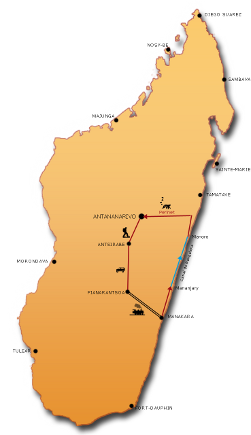 The Pangalanes channel is 665 kms long from north to south, the train from Manakara to Fianarantsoa, the Highlands and lemurs in Périnet are featured in this wonderful trip to Madagascar. An original discovery of the country. After Fianarantsoa (an area famous for its tea and wine), we take local transport to get to and along the East Coast: train, bush taxi, boat. The pace is deliberately slow to allow us to go to meet people and create the exchange. Our accommodations are simple, sometimes in cottages, sometimes in tents.
The Pangalanes channel is 665 kms long from north to south, the train from Manakara to Fianarantsoa, the Highlands and lemurs in Périnet are featured in this wonderful trip to Madagascar. An original discovery of the country. After Fianarantsoa (an area famous for its tea and wine), we take local transport to get to and along the East Coast: train, bush taxi, boat. The pace is deliberately slow to allow us to go to meet people and create the exchange. Our accommodations are simple, sometimes in cottages, sometimes in tents.
 Highlights
Highlights
- The amazing diversity of landscapes of the Highlands and the East Coast;
- A remarkable wildlife in Andasibe-Mantadia National Park ;
- A smooth and passionating approach to lemurs ;
- Sainte Marie, Nosy Boraha, sweetness and scent, white sand and coconut palms.
Travel identity card
- Duration: 7 days (from Tana to Tana)
- Participant: From 2 persons
- Support crew : English-speaking Malagasy Guide
- Accommodation: All in hotel (6 nights)
- Vehicle : 4x4 or bus or minibus
- Meals : Bed and Breakfast
- Period: all year
Les points forts
- Diver
 sité des paysages ;
sité des paysages ; - Faune et flore remarquable|Perinet ;
- Approche douce des lémuriens ;
- Sainte Marie, Nosy Boraha, sable blanc et cocotiers.
La carte d'identité du voyage
- 7 jours (de Tana à Tana)
- A partir de 2 personnes
- Avec guide malgache francophone
- Tout en hôtel (06 nuits)
- Véhicule 4x4 ou bus ou minibus
- En Bed & Breakfast
- Période: Toute l’année
 The principle of our "Slow Travel" is simple, it's about traveling while taking the time to do things, to see people, to understand their daily lives. This approach to Madagascar is intended to be intimate and gentle.
The encounter with the Indri-indri, the largest of the lemurs, in the Perinet reserve is always a moving moment. The local guide will tell us about his customs and his legend. On the Canal des Pangalanes, we stroll through the villages and discover the way of life of the fishermen, between lagoons and ocean.
The charming little island of Ste Marie invites us to beautiful walks along the beaches or by bicycle going up towards the north or towards the east coast.
The principle of our "Slow Travel" is simple, it's about traveling while taking the time to do things, to see people, to understand their daily lives. This approach to Madagascar is intended to be intimate and gentle.
The encounter with the Indri-indri, the largest of the lemurs, in the Perinet reserve is always a moving moment. The local guide will tell us about his customs and his legend. On the Canal des Pangalanes, we stroll through the villages and discover the way of life of the fishermen, between lagoons and ocean.
The charming little island of Ste Marie invites us to beautiful walks along the beaches or by bicycle going up towards the north or towards the east coast.
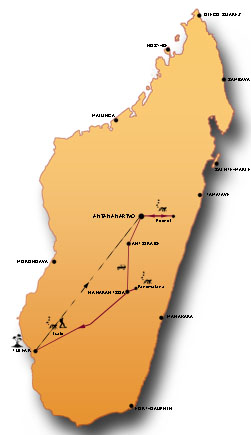 It is just an approach because time is limited, traveling several months is needed to apprehend a large number of Madagascar birding sites.
Malagasy aviary is unbelievable ! not particularly by its density but its endemism above all, 107 endemic species amongst 294. Nowhere else but here, in this region, in this Reserve or National Park, in this valley to encounter this or that species. That is the case for the Fitatrala (Copsychus albospecularis), the Firasa (Accipiter madagascariensis), the Akohonala, the crested Ibis (Lophotibis cristata) … and many others !
You are with a specialist !
Best months: october – november
It is just an approach because time is limited, traveling several months is needed to apprehend a large number of Madagascar birding sites.
Malagasy aviary is unbelievable ! not particularly by its density but its endemism above all, 107 endemic species amongst 294. Nowhere else but here, in this region, in this Reserve or National Park, in this valley to encounter this or that species. That is the case for the Fitatrala (Copsychus albospecularis), the Firasa (Accipiter madagascariensis), the Akohonala, the crested Ibis (Lophotibis cristata) … and many others !
You are with a specialist !
Best months: october – november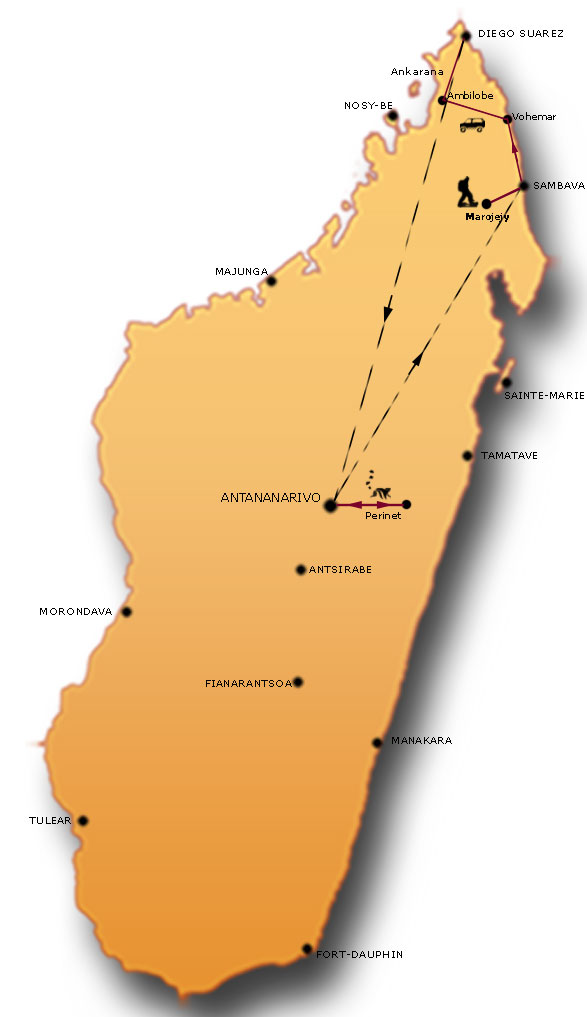 Lemuria, a lost continent in the Indian Ocean, of which Madagascar would be one of the last original gardens…
Indeed, this island with an extraordinary biodiversity shelters the majority of the present lemurs in the world. There are five families, 15 genera and 103 species and under species which represent an inestimable biological, cultural and economic richness.
These sociable and peaceful primates are essentially threatened by the destruction of their housing environment, the rainforest. They are part of animals the most threatened to the world today, although numerous actions are jointly led between Madagascar National Parks, the local communities, the non-governmental organizations and the researchers to contribute to protect them more effectively. THE UICN (International Union for the Preservation of the Nature) established a classification of the status of preservation of the species that is regularly updated in which 25 species of endangered lemurs.
We invite you to an unforgettable journey to meet these surprising companions, the perfect ambassadors of the peculiarity of the fauna of Madagascar
Lemuria, a lost continent in the Indian Ocean, of which Madagascar would be one of the last original gardens…
Indeed, this island with an extraordinary biodiversity shelters the majority of the present lemurs in the world. There are five families, 15 genera and 103 species and under species which represent an inestimable biological, cultural and economic richness.
These sociable and peaceful primates are essentially threatened by the destruction of their housing environment, the rainforest. They are part of animals the most threatened to the world today, although numerous actions are jointly led between Madagascar National Parks, the local communities, the non-governmental organizations and the researchers to contribute to protect them more effectively. THE UICN (International Union for the Preservation of the Nature) established a classification of the status of preservation of the species that is regularly updated in which 25 species of endangered lemurs.
We invite you to an unforgettable journey to meet these surprising companions, the perfect ambassadors of the peculiarity of the fauna of Madagascar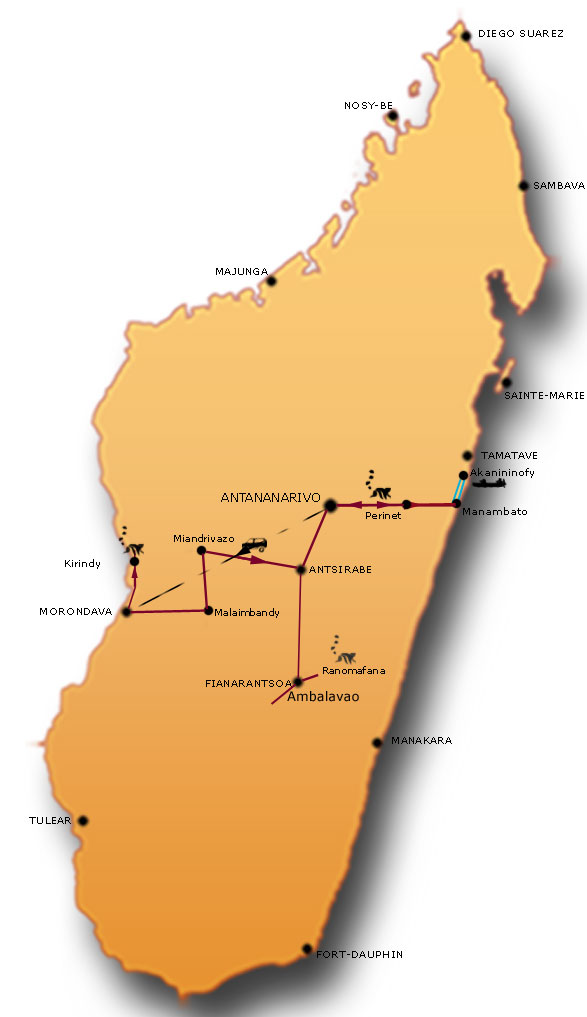 In Madagascar, wildlife is everywhere! From North to South, from East to West… mammals, reptiles, batrachians, fish, butterflies and birds inhabit this nature sanctuary. Madagascar National Parks manages 43 parks, but there are nearly 120 protected areas which are distributed across the country under various categories.
It is difficult not to forget anything as this fauna, whose rate of endemism reaches 80%, is rich and diversified.
It is present all over the island, in the heart of the dry or humid forest, in the savannah and the thorny bush, at the bottom of the canyons, at the edge of the lakes and rivers... and of course, in the magnificent seabed of the Indian Ocean.
We are going to meet this unique heritage in the heart of some of the most renowned reserves and national parks in Madagascar.
In Madagascar, wildlife is everywhere! From North to South, from East to West… mammals, reptiles, batrachians, fish, butterflies and birds inhabit this nature sanctuary. Madagascar National Parks manages 43 parks, but there are nearly 120 protected areas which are distributed across the country under various categories.
It is difficult not to forget anything as this fauna, whose rate of endemism reaches 80%, is rich and diversified.
It is present all over the island, in the heart of the dry or humid forest, in the savannah and the thorny bush, at the bottom of the canyons, at the edge of the lakes and rivers... and of course, in the magnificent seabed of the Indian Ocean.
We are going to meet this unique heritage in the heart of some of the most renowned reserves and national parks in Madagascar.



